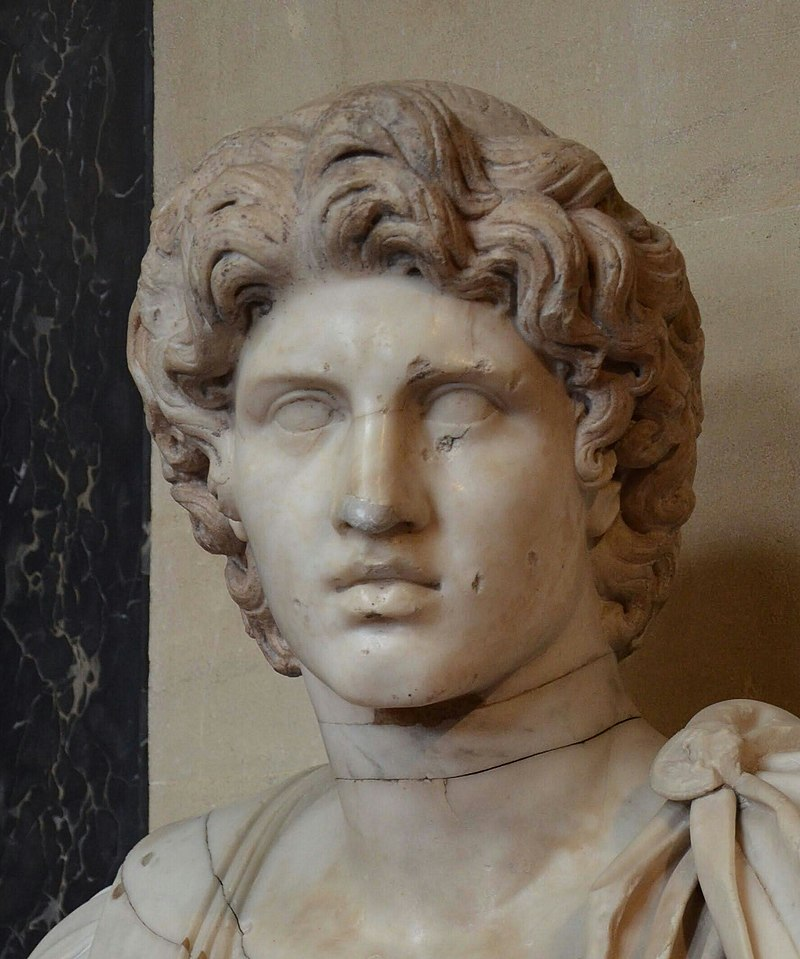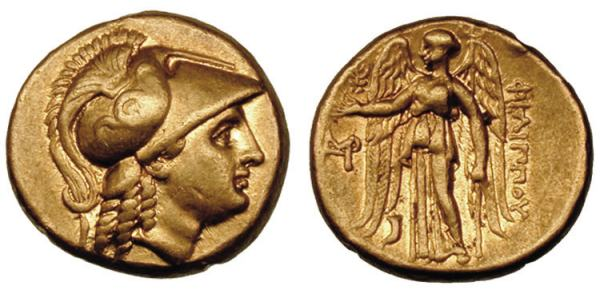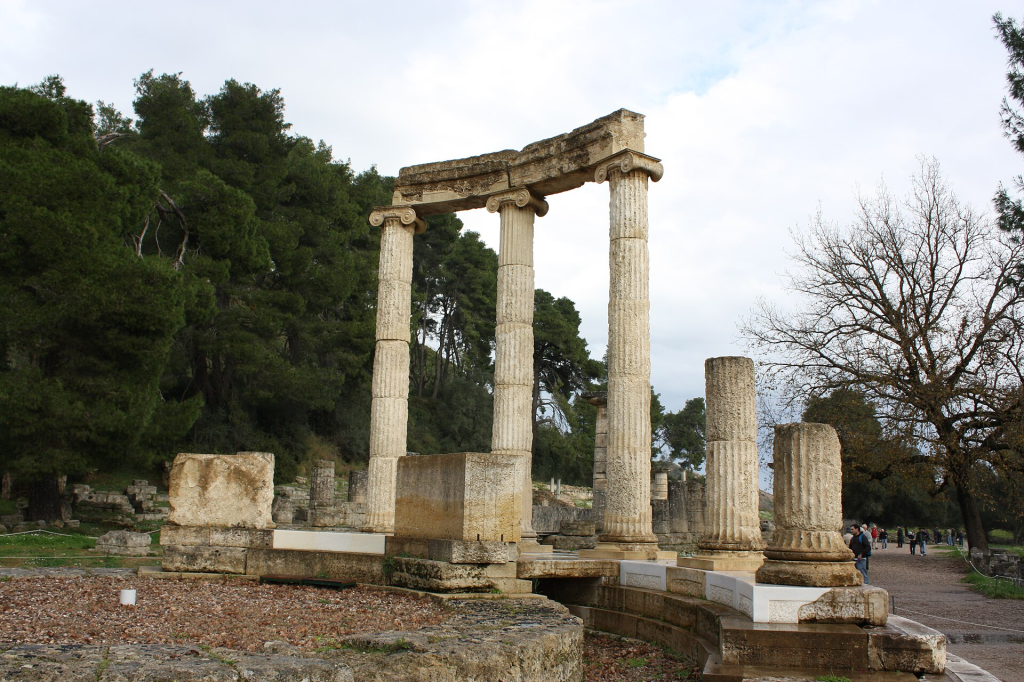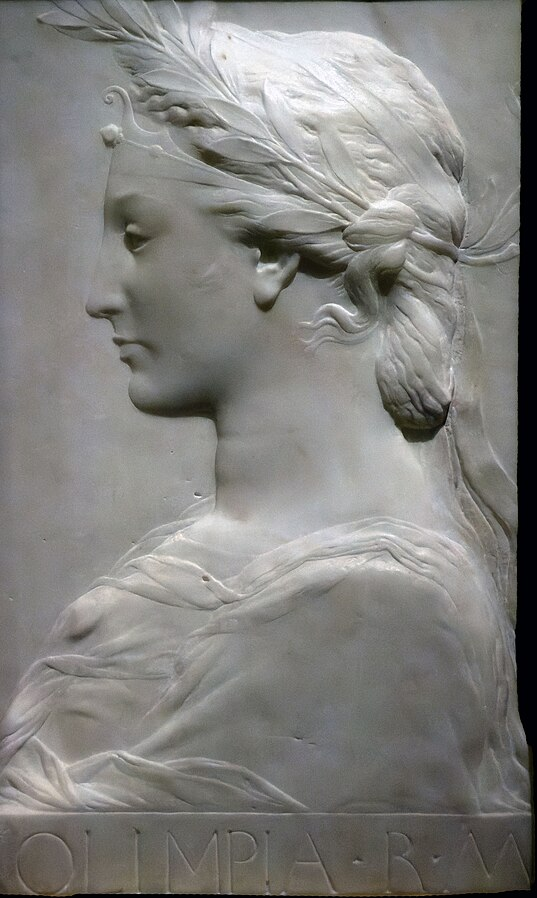Claiming descent from the son of Zeus himself, Herakles, through his great-great-grandson Temenus, king of Argos, the Argead Dynasty were the founders and rulers of Macedon from about 700 to 310 BC. The kingship of Argead was “personal” in its style. The king wielded the real power and authority and, except of course for the king himself, all positions were held ad hoc and at the king’s discretion. Therefore, influence in the Argead Dynasty of Macedonia was entirely dependent on one’s access to the king’s person. If a king wished to delegate authority, he would do so for as long as the person so honoured was able to maintain the king’s trust. Thus the realm was, in essence, an extension of the royal household in which the king assumed the rights and responsibilities of the head of the household and fatherhood as they were understood throughout the Greek world at the time. As such, the king’s power and authority were not only constitutional, but was also founded on religious and moral authority.

The Argeads never had a well-defined succession principle, and it appears that the only requirements for a would-be monarch to be considered for the throne were that he be a male member of the Argead family. However, despite the undeniable fact that sons frequently succeeded fathers, because Macedonia was almost never free of significant foreign threat, competence and ruthlessness were more important for kingship – and women were also often just as capable of being as competent and ruthless as their male counterparts, if not more so. Therefore, although sons had strong claims on the loyalty of the people when their royal fathers died, the throne was almost always quickly occupied by the strongest adult Argead male available at the time who may or may not accompanied by an Argead female holding almost just as much power behind the scenes.
This insight into the dynasty is important especially at the end of Alexander the Great’s reign, and no doubt every single female members of Alexander’s family were aware of the potential power they would potentially hold if they had the king’s ear. As Alexander was himself conscious of removing potential royal rivals at the start of his reign, and because he was never particularly concerned with fathering an heir, the only adult Argead male living at the time of Alexander’s death was his half-brother Arrhidaeus (c. 359 BC – 317 BC) who was widely considered to be too mentally deficient to rule a kingdom and, although Alexander’s Bactrian wife Roxane was pregnant at the time of his death, no one knew whether the pregnancy would result in a son. Even if Roxane did proceed to give birth to a son, the situation of not having a direct male heir to the throne was so unusual that no one knew what to do with the Argead throne until Alexander’s son, who was at this stage was still unborn (and the fact that the baby would be a male was still uncertain), could assume authority in his own right. This created an unprecedented situation at a particularly dangerous time for the Macedonians before the vast Persian Empire was fully pacified.

Although Roxane would eventually give birth to a son who was later known as Alexander IV, long before the birth of the younger Alexander a near-civil war within the Macedonian army gave rise to an unwanted solution to the question of the succession to the throne. Under the leadership of Perdiccas, one of the highest-ranking officers in Babylon where Alexander the Great died, it was agreed that the inept Arrhidaeus would become king, albeit mostly to perform important religious rituals associated with the position. However, if Roxane had a son, that child would also be recognised as king. Therefore, when Alexander IV was born, an unprecedented joint kingship was then established. Perdiccas used his rather lucky possession of Alexander the Great’s body and signet ring to gain widespread recognition of his role as the kings’ regent and protector. However, to secure this recognition, Perdiccas also had to oversee a general distribution of powerful appointments to his military peers. This distribution would later ensure the dismemberment of Alexander the Great’s Empire.

Philip III Arrhidaeus (323-317 BC). AV stater Head of Athena left, wearing crested Corinthian helmet ornamented with coiled serpent device / Nike standing right, holding wreath and stylis, FILIPPOU monogram in left field, horn under left wing.
Another one of Alexander’s half-siblings, Cynane, saw the elevation of Arrhidaeus who took the name Philip III in his ascent to the throne as an opportunity to elevate herself to the centre of court. Keeping abreast of events leading up to the two kings, Cynane prepared to act decisively in 322. At this point, the joint kingship had only been in place for a little over a year, but the compromise that had brought the kings into Perdiccas’ care was beginning to unravel as people, particularly the generals Antigonus in western Turkey and Ptolemy I Soter in Egypt, began to question whether the decrees Perdiccas was issuing in the names of the kings were as much for the good of the empire as they were for Perdiccas. Perdiccas and the kings travelled to western Turkey to deal with a variety of issues, particularly Antigonus’ open hostility.
With Perdiccas and the kings so close to Macedonia, Cynane took her daughter Adea to visit them. Despite attempts by Antipater, the Macedonian in charge of Europe at the time, to restrain her, Cynane fought her way out of Macedonia with the intention of arranging Adea’s marriage to her uncle Arrhidaeus. Cynane’s strategy was simple, she intended to use Adea’s connections to Perdiccas III and Philip II, as Adea was the granddaughter of both, as a pretext for demanding that Adea marry Arrhidaeus in front of the Macedonian army. Cynane knew that marrying the still unwed Arrhidaeus to the doubly Argead Adea would be very popular among the army’s rank and file who would eagerly await any children the union might produce.
Cynane, “the Illyrian” Princess, Half-Sister of Alexander the Great
Cynane (c. 357–323 BC) was the daughter of King Philip II of Macedon with the first of his seven wives, Audata, princess of Illyria. This makes her Arrhidaeus’ and Alexander the Great’s half-sister. When Philip II defeated the Illyrian king Bardylis in 358 BC, he took Audata as a spoil and a mean of keeping the peace. Audata was the first of Philip’s seven wives, including Alexander’s mother Olympias. A true Illyrian princess, Audata was the product of her culture’s practise of raising girls as warriors, which she instilled in her daughter who would go on to pass this on to her own daughter when the time came. Cynane was raised in the Illyrian tradition, learning martial arts and how to hunt, track, ride and fight. By the age of twenty, Cynane was well known for these abilities and became famous for her bravery and brilliance in battle. She is said to have accompanied the Macedonian army on a campaign into Illyria in her teens and slain Caeria, the Illyrian queen, in hand-to-hand combat, possibly one of her own relatives from her mother’s line. Unfortunately, no account of that first encounter between two armed female leaders in European history has survived.
Except for her education, which was unusual for a woman in Macedonia at the time, little is known about Cynane until Philip arranged her marriage to his nephew, Amyntas (c. 337). This Amyntas was the son of Perdiccas II, who had ruled before Philip. Amyntas appears to have succeeded Perdiccas as king briefly, but he was nothing more than a baby at the time, and his extreme youth at the time of his father’s death invited the Illyrians and other enemies (foreign and domestic) to ravage the Macedonian countryside. To bring a competent soldier to the throne, Philip deposed Amyntas and took the throne himself, but he spared Amyntas’ life and even raised him in his court.
A daughter named Adea was born in around 336 BC from Cynane and Amyntas’ marriage. Adea was later known as Eurydice. The year of Adea’s birth was likely also the year that Philip was assassinated. In the chaos that followed the king’s death, Philip’s son Alexander (later known as Alexander the Great) assassinated Amyntas to ensure his own smooth accession to the throne. Not long after Amyntas’ death, and likely to remove Cynane and her infant daughter from Macedonia, Alexander betrothed Cynane to Langarus, a leader of the Agriani which was one of the lesser allies of the Macedonians. However, Langarus died before this marriage could take place. Because Cynane did not want Alexander to intervene and arrange another marriage for her, she withdrew from the Macedonian court. She trained Eurydice in military matters, brooded over her husband’s injustice and bided her time until such time that she could come back to the court to demand her place.

Growing Up as an Illyrian Woman
It would have been much too easy to dismiss Cynane’s battle prowess and political acumen as legend created to romanticize her. However, Illyrian women are depicted in historical records fighting in battle, wielding political and military power, and rising to positions of leadership. They drank with men at banquets and even raised a toast, which was unheard of in ancient Greece or Rome. Five 1800-year-old ivory tablets discovered in the Albanian city of Durres give us an additional insight on the role of women in ancient Illyrian culture and, consequently, an insight on how Cynane would have been educated by her mother. Inscriptions on the wax tablets show that women participated in high-level financial transactions which lends credence to the theory that men and women had equal status in ancient Illyria. Within the liquid were two styluses, an ebony comb, and five wax-coated ivory writing tablets. The tomb’s comb and other features indicate that it belonged to a wealthy aristocratic woman.
The inscriptions reveals new insights into life in the former Roman colony of Dyrrachium (modern-day Durres) in the second century AD. Although Dyrrachium had been inhabited since the 7th century BC, it was conquered by the Romans after the Illyrian Wars with the Roman Republic in 169 BC. According to the translations of the inscriptions, the tablets formed a debt book, recording amounts owed as well as interest to the woman buried in the tomb.
Later, in writing about Cynane’s daughter Adea, who has changed her name to Eurydice, Duris of Samos explained Eurydice’s unusual behaviour by saying she learned the art of war from Cynane “the Illyrian”. Duris’ epithet, combined with the statement that Cynane trained her daughter in the arts of war likely indicates that Cynane’s mother Audata brought an Illyrian matriarchal tradition with her into the Argead dynasty. We can well deduce from Cynane’s qualification by Duris that, if not her ethnicity, at least Duris was trying to highlight her apparent cultural identity as Illyrian. However, this epithet also likely betrayed Duris’ dislike towards this woman whom he has likely never met. This may be his way of highlighting the fact that, by virtue of her mother, Cynane was not Greek, or rather, that her mother Audata was a barbarian in the eyes of the Greeks despite her status as the first wife of the king.
The Death of Alexander the Great and Cynane’s Play for Power through her Daughter
When Alexander the Great died in Babylon in 323 BC, Cynane saw her half-brother’s death as an opportunity and acted quickly to seize it. As she was only in her early thirties and a very eligible match at the time, she could have offered herself as a bride to Arrhidaeus. However, she chose instead to raise and eventually gain her power through her daughter. Cynane quickly mobilised her troops and led Adea and her army to Babylon to force a marriage that would secure both her daughter’s and her own future. Such a move would have been repulsive to Perdiccas as it would have deeply unsettle Babylon’s already shaky power structure. The move would give one of the two reigning kings more legitimacy and strengthen the monarchy as a whole and reducing the influence of the generals, including Perdiccas himself. Indeed, Adea, as queen, would be able to speak and act for her royal husband, potentially eliminating the role of the regents and protectors entirely.
Cynane would be able to seize power through her daughter, and as Philip II’s daughter and Alexander’s half-sister, she would naturally command the loyalty of Alexander’s vast army. Perdiccas dispatched Antipater, one of Alexander’s generals, to Strymon, where Cynane quickly defeated him and dragged him away from the field towards Babylon. When Perdiccas realised he needed to halt her advance, he gathered a second force to oppose her. He carefully chose his brother, Alcetus, to lead the Macedonians not for his battle prowess, but because he had been one of Cynane’s court companions when they were young. The plan appears to have been for her to abandon her mission and return to Macedonia quietly when she sees her dear childhood friend leading an army against her. Perdiccas’ hopes were pinned on Alcetus defeating her honourably in battle and preventing her from interfering again.
Perdiccas’ plan for Cynane to quietly surrender did not come to fruition. The Macedonians paused at the sight of Philip’s daughter and Alexander’s sister. For her part, after reproaching Alcetas for ingratitude and undaunted by the number of his forces and his formidable battle preparations, Cynane engaged her childhood friend in combat, preferring a glorious death in battle rather than a private life unworthy of Philip’s daughter. However, in her own belief in her cause and her own personal power, Cynane grossly underestimated Perdiccas’ ambitions and Alcetus’ willingness to go to keep his brother in power. Cynane died in the hand of her childhood friend Alcetus.
Although Alcetus may have thought that any questions about succession would be resolved upon Cynane’s death and his brother’s plans would be secure, when the Macedonian army witnessed Cynane’s assassination by their general, they revolted and demanded that Adea, as Alexander’s niece and Philip II’s granddaughter, marry Arrhidaeus as Cynane had desired.
Adea took the name Eurydice after marrying Arrhideaeus (who became Philip III), and as her mother had wanted for her, Eurydice rose to power behind Philip III, speaking for him and making decisions on his behalf even before the First Diadochi War and Perdiccas’ death. Her choice of the name Eurydice would have been a clear indication of her own ambition, as the last Eurydice in her family had been the mother of Philip II himself, who had saved the throne of Macedonia from Ptolemy’s schemes and the pretender Pausanias in her time. The younger Eurydice now intended to do the same for hers by having children by Philip III who would succeed Alexander’s line as Macedonia’s future monarchs. With this new name, she claimed to be the true successor of the previous Eurydice, as she was twice her descendant through Perdiccas III and Philip II, just as Cynane had planned for her. By comparison, while Olympias had given birth to Alexander the Great, Alexander’s son was not yet old enough to rule and could not combine the claims of both Perdiccas’ and Philip’s lines as Eurydice could through her line.
Before Antipater could make peace with Perdiccas’ army and claimed himself also as guardian or protector of the kings, Eurydice declared that she and her husband had no need for an aristocratic guardian, because Philip was capable of ruling on his own behalf with her guidance. Eurydice was able to rouse the Macedonians on hand against those who would mobilise the troops against the interests of the established royal dynasty as represented by herself and her husband by understanding the army’s unrest over delayed payments and using it to her advantage.
Her method was so successful that, when Antipater arrived at their camp he found Eurydice to be very close to inciting a riot. Antipater and Antigonus were able to regain control of the situation just in time by asserting their status as established generals while persuading the army that this young queen was only a newcomer to the complicated game of politics. Eurydice’s effort was thus thwarted. Antipater returned to Macedonia where he strictly managed the kings until his death in 319.

Following Antipater’s death, the kingdom was again openly divided into two factions, each led by Olympias, Alexander the Great’s mother, on the side of her grandson Alexander IV, and Eurydice on the side of her husband Philip III. In the ensuing conflict, Olympias invaded Macedonia from the west with an army gathered from Epirus, and Eurydice raised her own army in defence. Olympias dressed herself in the robes of a Dionysus devotee while Eurydice, in line with her Illyrian heritage and experience in battle, rode to battle dressed as a man. However, her dressed proved to be a mistake as the Macedonians were unable to follow a warlike Illyrian queen into battle against Alexander the Great’s mother. They betrayed both Philip III and Eurydice by surrendering to Olympias. Philip died of starvation within weeks, and Eurydice was forced to commit suicide. For at least a decade after, as Cynane would have wanted, Macedon was indeed led by a powerful woman. But it was not led by herself or her daughter, instead it was led by Olympias who acted as a regent to her own grandson, Alexander IV.
